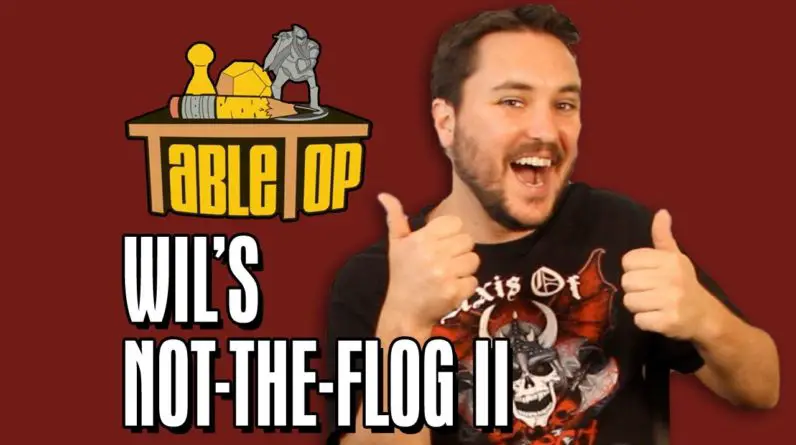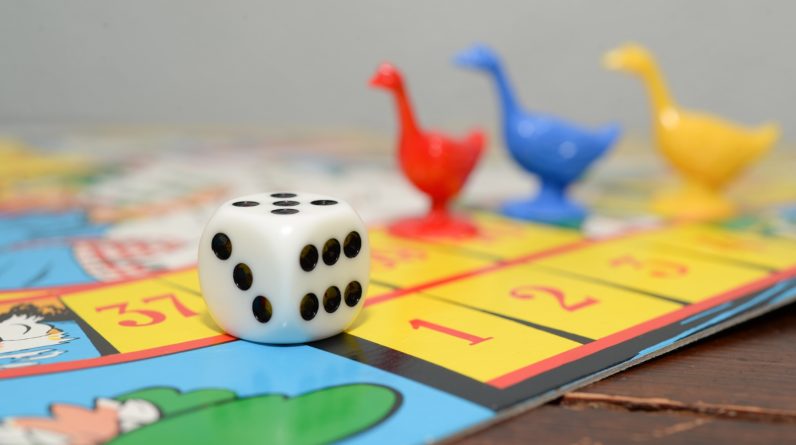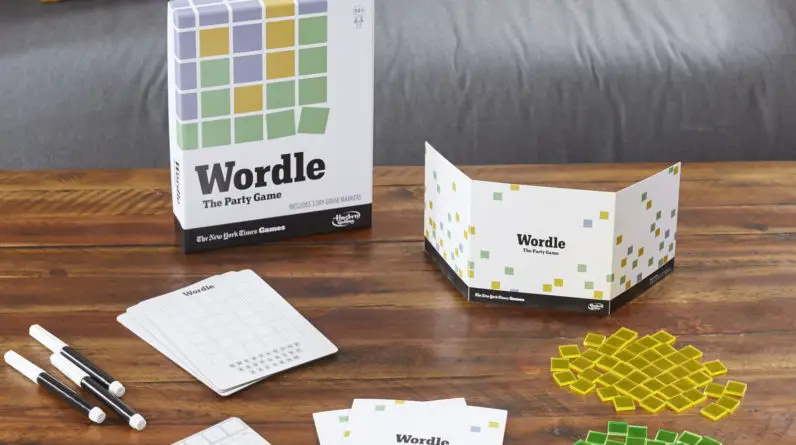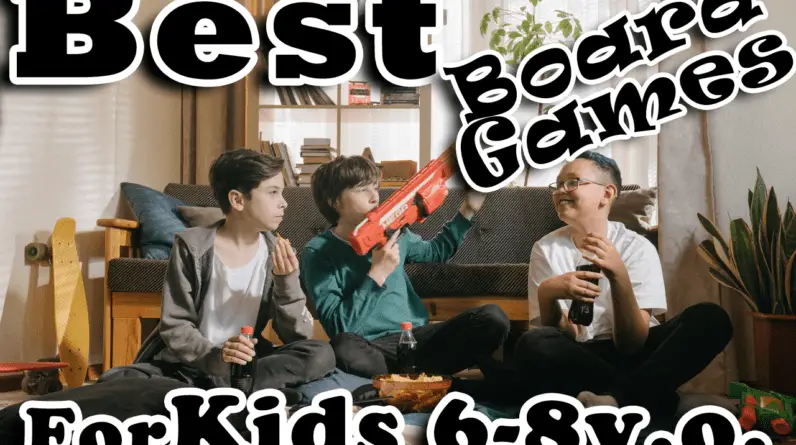
Wil Wheaton – NOT The Flog 2 (TableTop Bonus)
Hi, I’m Wil Wheaton. And this is my cat Luna. Luna’s kind of an [BLEEP]. This week on Wil Wheaton presents “Not the Flog,” I wanted to talk about indie RPGs. One of my favorite episodes last season was “Fiasco.
” It was a non-traditional role-playing game that’s really just about storytelling, and character development, and working together to build a story. And that’s one of the things that the Indie RPG movement really, really represents very well. And I don’t know if we’re every going to be able to do a “TableTop” that really focuses on a lot of these games. So I just wanted to introduce you all to some of them today.
Really, Riley?
Kind of trying to do a show here. This is my show, it’s not “The Flog.” All right. So let’s get started. One of the earliest experiences I had playing in Indie RPG is this game called “Primetime Adventures.
” Now I’m not entirely sure that “Primetime Adventures” is still in print. Although I’m fairly certain that you can get from one of the online retailers, or you can just get it as a PDF that you then go and print out yourself. But here’s “Primetime Adventures,” OK. The players are all building a television show. You get together with your friends and you pitch a TV show to each other.
You all decide, OK, we’re going to tell a detective TV show, OK. And we’re all going to play these different characters. You decide who the characters are. And then one of you becomes the producer for that week. The producer changes every time you play.
And the producer is like your supporting characters, and maybe the adversaries. What’s really fun about this is that just like in the actual television world, you’re going to get together the first time you play, and you’re going to make a pilot.
And if everyone enjoys the pilot, then the series gets picked up, and it runs for five or 10 episodes, or whatever. Every time you play, a different character is in the spotlight. And there are different reward systems for how you make the audience happy.
And have different things happen in the game. And it’s not about winning. It’s about working together to tell a great story. If you enjoyed “Fiasco” and if you especially enjoyed the writing aspects of “Fiasco,” I think that you would really enjoy “Primetime Adventures.” Another amazing Indie role-playing game is “The Extraordinary Adventures of Baron Munchausen.
” This is a game that can be played in about 45 minutes. And is one of the most insanely fun role-playing experiences I have ever had. James Wallis, who is one of the designers of the game, calls it a game of competitive lying. You and your friends have all gathered at some kind of posh exclusive club, typically in London in the 1600s or 1700s, but sometimes it can be elsewhere in the world.
You are all noble lords and ladies, and admirals, and explorers, and whatever, in the vein of Baron Munchausen.
You’re getting together to tell ridiculous tall tales in the style of Baron Munchausen. For example, you might say, oh, Baron, tell us about that time you lost both of your legs in the Battle of Utrecht and how you recovered them. Or you might say, oh, Baron, tell me how you accidentally started the American’s War of Independence. So then the person who is the storyteller starts telling the story of how that happened.
But at various points in the storyteller’s experience, anyone else at the table can challenge an aspect of the story.
So you could say, but Baron, tell me again how was it that you actually flew to the sun while being dead. And then the person who is the storyteller would have to accept that offer, and incorporate that into the story, or tell that person that they are misremembering the way the story went on, and then get back to the story. It is so much fun. And you’re passing coins back and forth, as the currency of the game. And whoever wins the game has to buy a round of drinks for the table.
And then the game starts over again. “The Extraordinary Adventures of Baron Munchausen” was out of print for a very long time. But it recently came back into print. And I am told by James Wallis that it came back into print because I played it. I loved it.
I really wanted to keep playing it. But I couldn’t find it in print. I could find used copies for hundreds of dollars online. So he decided to put it back into print.
So you can buy it directly from him.
You can get it from a few retailers. And I understand that it will be widely available soon. And the book is hilarious. It’s written as if Baron Munchausen wrote it himself. And it’s really, really a lot of fun.
The next game I wanted to talk to you about is called “Agents of Oblivion.” I’m going to sum this up for you in just a few words and it’s all you’re going to need to know. You are members of a super secret global espionage team. Your entire purpose in life is to stop Cthulhu and the great old ones from coming into the world. That’s the game.
Right now you’re either going, holy [BLEEP] Wil Wheaton, how do I get my hands on a copy of that? Or you’re like, meh. And honestly, if you’re meh, I don’t know how you’re even watching this, Mom. The next Indie RPG that I really like is called “Dungeon World.” It’s based on the Apocalypse World engine.
In “Dungeon World,” you’re rolling D6 to try to accomplish all of your tasks. But here’s what happens. When you hit your target number, you accomplish your task and things go on as normal. If you hit your target number and then go over a certain amount, then you accomplish your task and something interesting happens. If you miss your target number and don’t manage to accomplish your task, sometimes you’ll still accomplish that task, but something interesting will happen.
And it’s really up to the gamemaster to decide what sort of interesting thing happens in the game as the players play it.
Let’s say you’re trying to open up a chest, OK. You’re trying to pick a lock. And your thief fails the role. In D&D, generally the GM just goes, nope, you just didn’t do it.
Oh OK, well I guess we’ll just keep rolling until I do. In “Dungeon World,” when your character tries to open up the chest and fails, maybe the chest opens. But as the lid of the chest opens it crashes into the back of the dungeon wall and that wakes up the goblins across the hall. And another really cool thing about “Dungeon World” is that it was funded entirely on Kickstarter. In the back of the book are these names of all the people who helped fund it.
And I just think that’s really, really super cool. And it’s a great alternative to the traditional fantasy RPGs that we all know, and let’s face it, love. No, you really do. So the next game I wanted to talk to you about, I actually don’t have the physical book, because I play using my PDF copy on my iPad, is a game called “A Penny for my Thoughts.” And it was designed by my friend Paul Tevis.
The conceit of the game is that all the players have come to an institute where they are going to attempt to recover their memories.
You can’t remember anything about yourself, but all the players have taken some kind of drug called mnemosyne, I think. It lets them remember the memories of the other players of the game. So at the beginning of the game, all the players write down some suggestions on slips of paper and then those are thrown into a bowl. And then as the game is played, the slips of paper come out.
And you have to build a story using that suggestion on that piece of paper as a starting point. Then other players in the game can then offer, oh right, I remember this is what happened to you. It’s a really fun game. It lends itself to incredibly intense, incredibly emotional storytelling. Or the other side is just ridiculous Gonzo storytelling.
The base game has all the players just as regular people in the modern world. But you can play games where you’re all “Bourne Identity” people, or you’re all science fiction people. It plays in between two and three hours, and is one of the very few games that you can pick up the book, start reading, and be playing almost immediately. OK, the last thing I want to talk about today is a throwback to the game that brought us all into role-playing if you’re 40 and me. Actually, if you were me and not 40 that would be weird.
Because that would mean that we’ve somehow created some kind of time traveler paradox.
Go back to your own timeline Wil Wheaton. The game that I want to talk about is “Castles & Crusades.” This game is awesome. It is very much the spiritual successor to “Dungeons & Dragons,” first edition.
If you liked those old games of real hack and slash, dungeon crawling, village burning, dragon slaying, orc marauding role-playing, and for whatever reason you don’t want to just go and get the first edition D&D books, “Castles & Crusades” is a perfect re-creation of that experience that we all had when we were in middle school or high school in the ’80s playing role-playing games for the very first time. And one of the things that’s really great about this is that they are constantly developing new modules and putting out supplements for it. And there are conversions so that you can take some of those classic D&D modules that have recently been re-released online, like “Keep on the Borderlands,” or “Against the Giants,” or “Sinister Secret of Saltmarsh,” and convert it to use the “Castles & Crusades” rule system.
It’s really great. It’s three core books– Players Guide, the DMs guide, it’s called the “Castle Keeper’s Guide,” and then there’s a monster manual.
I just really enjoy it. And the guys that put this game out are also really great guys. I really like them. I met them at Gen Con last year. And I was like, I’m glad you guys are making role-playing games instead of throwing stuff at my house.
Which generally kind of goes for everybody. Most everybody. Hey, thanks a lot for spending some time with me today on “Not the Flog.” I hope that this inspires you to head out and check out some Indie RPGs.
If there’s and Indie RPG that you love that I didn’t talk about, leave a comment about it and I’ll check it out.
And maybe we’ll do some more of these in the future. Maybe we’ll do some in the future where we just focus on one. Maybe we’ll do more in the future where we focus on one and I actually interview the designers. Would that be fun? I don’t know.
That’s why we’re only doing this. Thanks for watching “TableTop.” And until we see you next time, play more games.






